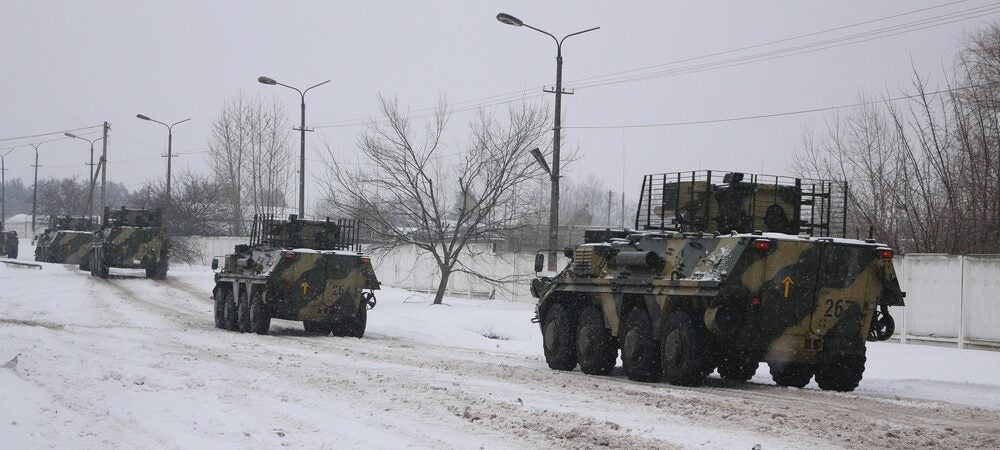Ukraine banned the export of wheat and other vital food commodities on Wednesday, triggering global fears for the food security of millions of people this year. Now the Pentagon has been urged to study how the disrupted food supply driven by Russia’s invasion of Ukraine will impact security around the world.
Global leaders from China to the United Nations have warned millions could suffer from Russia’s war as some food prices have already soared and supplies are disrupted or cut off completely for months or years to come. Some warn that suffering could spark violence in locations key to U.S. security concerns.
“Conflict and hunger are closely intertwined–when one escalates, the other usually follows,” said Gilbert F. Houngbo, president of the UN’s International Fund for Agricultural Development, or IFAD, in a statement last week. Dwindling supplies and spiking prices, he said, “could jeopardize global food security and heighten geopolitical tensions.” The Middle East and Africa receive 40 percent of Ukraine’s wheat and corn exports, he added.
Ukraine is responsible for about 6 percent of global calorie exports, said Joseph Glauber, a senior research fellow at the International Food Policy Research Institute, or IFPRI. But in Egypt, for example, half of its imported calories come from Ukraine and Russia combined. In Lebanon, Russia and Ukraine account for 34 percent of its imported calories.
“Because Ukraine is one of the world’s largest wheat suppliers, especially for the developing world, Russia’s actions could cause a spike in food prices and lead to even more desperate hunger in places like Libya, Yemen, and Lebanon,” Linda Thomas-Greenfield, the U.S. representative to the United Nations, said last month. “The tidal waves of suffering this war will cause are unthinkable.”
The Pentagon has not yet taken on a specific role in alleviating food security, Press Secretary John Kirby said on Friday, but the risk of escalation from it is “obviously…something that we are concerned about.”
In 2021, Ukraine harvested nearly 43 million metric tons of grain, including wheat, barley, and rye, and 40 million metric tons of corn, reported the U.S. Department of Agriculture in January. But that’s expected to drop dramatically if farmers can not plant or harvest their crops in a war zone, opening the door for geopolitical uprisings, political instability, and power grabs by extremist groups, experts say.
On Wednesday, the department predicted that Ukrainian exports of this year’s wheat crop are expected to decrease by 4 million tons to 20 million tons, a 17 percent decrease because “the conflict in that country is expected to disrupt exports from the Black Sea region.”
Russian exports are also expected to drop by 3 million tons to 32 million tons because of the war and the impact of recent sanctions. Wheat prices surged so high that they hit a cap that triggered a halt in trading six days in a row before sliding back on Tuesday.
Rep. Austin Scott, R-Ga., asked Ely Ratner, the assistant secretary of defense for Indo-Pacific security affairs, on Wednesday at a House Armed Services Committee to look at how a disruption in that food supply could impact national security.
“We need to be doing some type of analysis on what the political and economic disruptions look like when that food is no longer hitting the global supply,” Scott said. “All of our areas of responsibility need to be looking at what a reduction in food supply means for their particular areas.” Before Ratner could respond, Scott asked another question about Russia’s disputed claim to the Kuril Islands. But he is not alone in his concern.
Caitlin Welsh, director of the Global Food Security Program at the Center for Strategic and International Studies, said she frequently tried to get more attention from the Pentagon in conversations about food security while working in the State Department’s Office of Global Food Security.
The fear? Instability in Egypt, Iraq, Syria and Iran, which rely heavily on exports from Ukraine and Russia, Welsh said.
“To the extent that those countries’ security is affected by riots, or protests that threaten regimes, that’s how our interests could be threatened,” she said.
Food instability and high food prices were one factor that led to the Arab Spring in the early 2010s, said Molly Jahn, a professor of agronomy at the University of Wisconsin-Madison.
“A period of high prices…can set into motion these large scale, long-lasting geopolitical influences,” she said. “Ukraine and Russia account for 30 percent of the world’s wheat exports. If those exports are disrupted, and particularly if it’s not possible to plant the wheat crop in Ukraine in May, we could see real disruption.”
IFPRI’s Glauber said that Russia’s invasion will exacerbate global food supply issues for corn and wheat that already existed. Wheat stockpiles were low because of a bad harvest last year in Canada and north Africa. Ukraine is also the world’s third largest exporter of corn, which has high demand right now to feed livestock in China, which is rebounding from a disease that decimated the hog population.
But it won’t just be bad for places that have wheat-heavy diets and rely on Ukraine and Russia, Glauber said. All wheat and grain, regardless of where it is sourced from, will be more expensive because of the conflict.
“If wheat prices are up in North Africa, they’re up everywhere,” Glauber said. “It’s not just a crisis for the Middle East or North Africa, it’s a crisis for any country that’s importing a lot of wheat.”
Jacqueline Feldscher is senior national security correspondent at Defense One. Previously, she was national security and space reporter at Politico. Before that, Feldscher covered defense issues in Congress and at the Pentagon for the Washington Examiner, the Washington Times, and Navy Times, covering the Navy and Coast Guard. She’s a graduate of Boston University, and holds a master’s in journalism from the Medill School of Journalism at Northwestern University.
To read the full commentary by Defense One, please click here.

